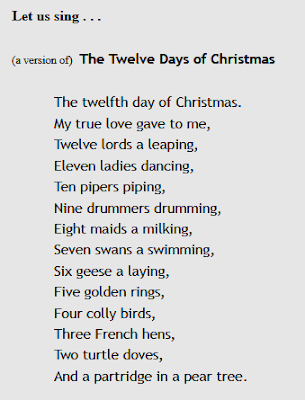Year
ends.
I count --
and count on --
mathy poems shared
here by countless poets. THANK YOU!
Friday, December 31, 2021
Year-end Counting -- with Gratitude
Monday, December 27, 2021
Amid uncertainties -- compose a Fib
How many Corona-virus cases will the new year bring?
Stop,
Think!
Wonder
What to say . . .
I gather my thoughts
and hope I can make a poem.
Monday, December 20, 2021
Christmas is coming . . .
This morning I did a blog search to see which of my previous posts included the word "Christmas" -- and this link leads to the results. And, for me as for many, a very familiar favorite (also posted back in December 2015) -- linking Christmas and numbers -- is this:
 |
| This Wikipedia link offers some history of this song. |
Wednesday, December 15, 2021
One-sentence Poems
Recently I came across the website onesentencepoems.com and, enjoying the items' brevity, I did some browsing -- and term-searching -- looking for mathy poems. Here are two samples by teacher and poet Jeffrey Park -- originally from Baltimore, now a teacher in Germany.
She always sleeps with protractor and compass
on the bedside table, never knowing when
a sudden fit of geometry will strike in the night.
Numeric
Numbers pelt down from an infinite sky, neither irrational nor imaginary,
the angular ones, 4s and 7s, doing maximum damage.
Monday, December 13, 2021
Mathematician with the Soul of a Poet
One of my long-time math-poetry connections has been with math-teacher-artist-writer Sandra DeLozier Coleman (This link leads to her prior appearances in this blog.) Coleman has had a long-term interest in the Russian mathematician-and-poet Sofia Kovalevskaya (1850-1891) and has recently published Mathematician with the Soul of a Poet -- Poems and Plays of Sofia Kovalevskaya (Bohannon Hall Press, 2021, available here from amazon.com); this volume that contains Coleman's translations from Russian along with background and thoughtful commentary. The opening section of the book begins with these words from Kovalevskaya:
I understand that you are surprised I can work at the same time
in both literature and mathematics. Many who have not had the
chance to learn more about mathematics confuse it with arithmetic
and consider it to be a dry and arid science. In truth, however,
this science requires the greatest imagination, and one of the most
respected mathematicians of our century has very rightly said
that it is not possible to be a great mathematician without having
the soul of a poet. S V. Kovalevskaya
Thank you, Sandy Coleman, for sharing Kovalevskaya's words with us!
Wednesday, December 8, 2021
STEM Writing Contests -- reminders . . .
WRITING deepens UNDERSTANDING!
For the reason above -- and for the possibility of winning recognition and prizes -- please consider the following contests.
The NYTimes has announced its 3rd annual STEM Writing Contest -- information is found here and 500-word submissions are invited during the period Feb 2-March 9, 2022.
To increase awareness of women’s ongoing contributions to mathematics, the Association for Women in Mathematics and Math for America are cosponsoring an essay contest for biographies based on interviews of math-women working in or retired from mathematical careers. The contest is open to students in Grades 6–8, Grades 9–12, and Undergraduate. For more information, please visit the contest webpage or contact the organizer, Dr. Johanna Franklin, at johanna.n.franklin (at) hofstra.edu. The submission deadline is February 1, 2022.Monday, December 6, 2021
Stories of Quadrilaterals
Sometimes I have time to browse my shelves and rediscover old favorites. Several of this blog's much-read poems have come from Scottish author Brian McCabe (Find blog search results at this link) -- and below I offer the first part of McCabe's two-part poem ("Two Quadrilaterals") entitled "The Restless Square."
Two Quadrilaterals by Brian McCabe
Part 1. The Restless Square
There was a square who yearned
to become something else.
It stretched its legs to mimic
an elegant rectangle but
lost its balance, leaned over
in a perilous parallelogram.
Thursday, December 2, 2021
Divided -- for facial recognition
Recently-retired Virginia dentist Eric Forsbergh sent me a mathy poem about the fascinating -- and controversial -- process of facial recognition. Enjoy!
Divided
Data-driven approach divided the face into 63 segments.
Nature Genetics, Jan. 2021
This, you can’t refute:
How data banks embed us.
Graphics now drag anyone
into granularity. As if
the features of a wave drew back
to reveal a pebble beach.



